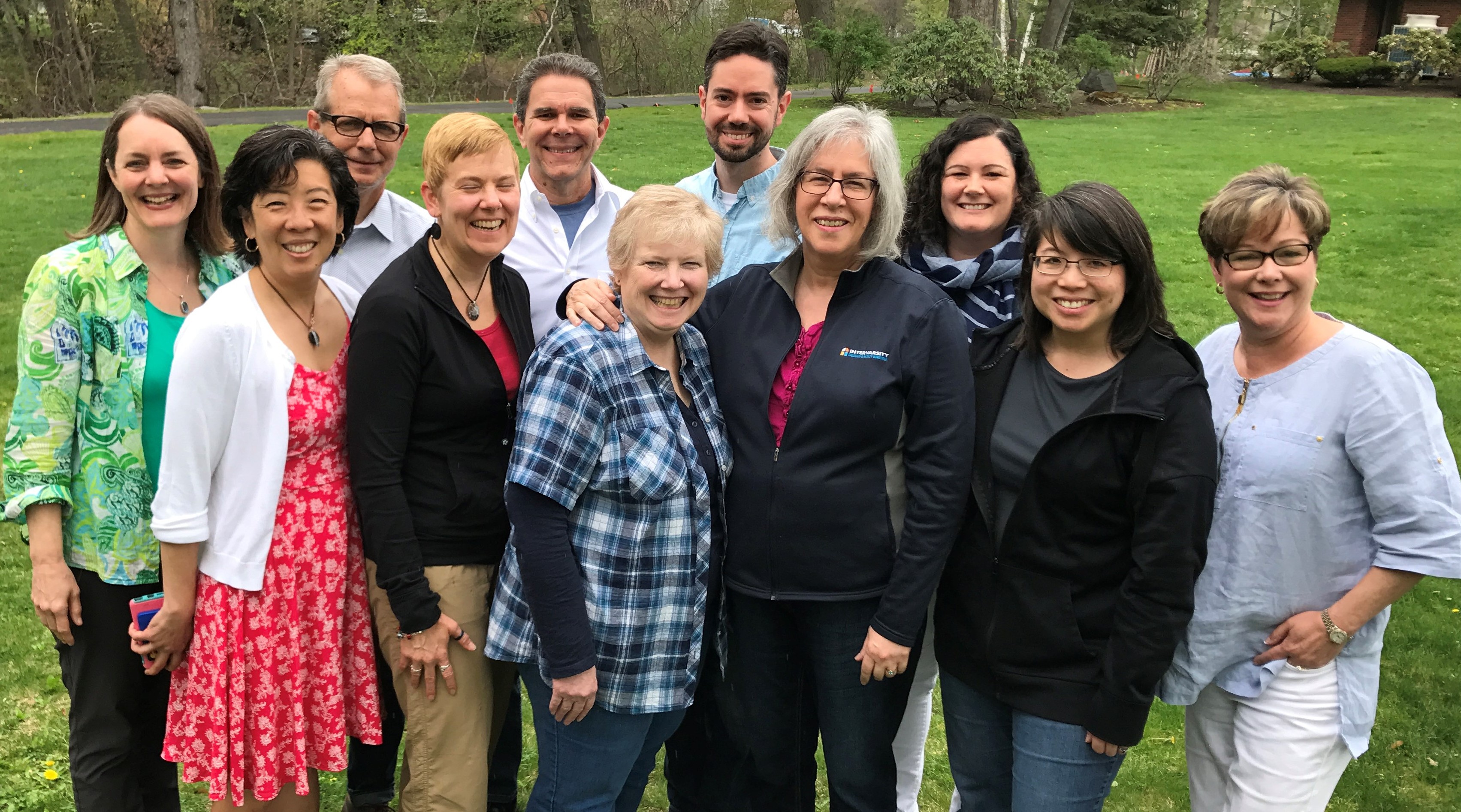Greetings colleagues—fellow missionaries in the work of seeing the gospel embodied in lives and communities on campus, by words, actions, and demonstrations of God’s power (to recall James Choung’s closing challenge to those of us at Mundelein in March): I pray that we all can draw on God’s strength and joy as we finish this ministry year and then experience some rest and restoration from God this summer.
Sneak Preview of the GFM Strategic Plan
 Guided by the 2030 Calling, Tom Lin and the Executive Leadership Team is submitting to the Board this weekend InterVarsity’s national strategic plan for 2018-2022. With that plan in view, the GFM Leadership Team (pictured here) has begun forming a four-year strategic plan for our part in the mission. We got off to a great start earlier this month in Boston; we will keep working on the GFM plan this summer and finish it at our team meeting in September. I anticipate six to eight major goals to focus our leadership efforts around the three large initiatives of the national InterVarsity plan: plant exponentially, mobilize partners to do ministry, and become a thriving organization of thriving people.
Guided by the 2030 Calling, Tom Lin and the Executive Leadership Team is submitting to the Board this weekend InterVarsity’s national strategic plan for 2018-2022. With that plan in view, the GFM Leadership Team (pictured here) has begun forming a four-year strategic plan for our part in the mission. We got off to a great start earlier this month in Boston; we will keep working on the GFM plan this summer and finish it at our team meeting in September. I anticipate six to eight major goals to focus our leadership efforts around the three large initiatives of the national InterVarsity plan: plant exponentially, mobilize partners to do ministry, and become a thriving organization of thriving people.
I’ll sketch here in simple form five major goals we are considering and, in each instance, an implied growth or change challenge for GFM and a hoped-for fruit for our mission. My goal is to stoke your vision and anticipation!
1. Plant witnessing communities on new campuses and new corners
Challenge: add many new CSMs and Associate Staff to plant; look for ways to catalyze planting by volunteers; increase faculty prayer cells and fellowships
Potential Fruit: More rapid expansion to campuses lacking ministry designed for grad students and faculty, especially the 51 R1 and 94 R2 institutions with no GFM presence
2. Partner to fully resource GFM staff through a multi-faceted, best practices approach to MPD
Challenge: better train and coach all staff in MPD core practices; pilot and adopt more communal/team approaches to MPD
Potential Fruit: all GFM staff fully funded and fully paid
3. Identify, engage, and mobilize more partners to carry out the GFM Mission
Challenge: all GFM staff invest slice of time annually to build active partnership with InterVarsity undergrad counterparts
Potential Fruit: huge increase of undergrad alumni connecting with GFM as new grad students; expansion of ministry with faculty by undergrad staff; concerted prayer for campus
4. Develop GFM staff as thriving leaders through spiritual formation and healthy organizational culture
Challenge: Increase intercessory prayer for staff, chapters, and campuses; foster a GFM culture of generosity
Potential Fruit: deeper dependence on God and one another
5. Strive toward a culture of inclusion as we grow the ethnic and cultural diversity of our staff teams for the sake of serving our diverse audiences effectively
Challenge: increase number of staff of color in GFM; work consciously to build hospitable teams
Potential fruit: staff of color flourish in GFM; students and faculty of color flourish in GFM on campus.
Please pray for the GFM Leadership Team as we discern and decide on the major goals and strategies for us to pursue in this next strategic plan. We want to challenge ourselves for the sake of the potential fruit while wisely assessing our capacity limitations and being good stewards of all of our staff and volunteers.
Recent Reading
I have been stimulated and encouraged by some of my recent reading. I’ll mention three books:
 The Art of Clearing Brush by Wendell Berry
The Art of Clearing Brush by Wendell Berry
This latest book by the prolific Berry includes essays, short fiction, and a long “Sabbath poem.” Whenever I read Berry, I am reminded afresh of our call to steward the created order and, even more, the human order at the scale of neighbor and community. (BTW: Berry’s descriptions of sustainable forestry prompted me to pick up a fascinating book called The Hidden Life of Trees, increasing my sense of wonder at God’s intricate creation)
 Not God’s Type: An Atheist Academic Lays Down her Arms by Holly Ordway.
Not God’s Type: An Atheist Academic Lays Down her Arms by Holly Ordway.
Ordway, a professor of English and also Cultural Apologetics at Houston Baptist University, recounts her story of coming to faith under the patient witness and love of her fencing coach—a story not unlike C. S. Lewis’s Surprised by Joy. The book illustrates the crossing of thresholds toward faith. I was encouraged by this testimony of a professor gradually opening her mind and then her heart to the loving reality of God.
- What are We Doing Here? Essays by Marilynne Robinson

In addition to Robinson’s novels (her most famous being Gilead, which won the Pulitzer Prize), I have relished her essays. This is her sixth collection, and like the others, left me filled with admiration for her incisive mind and her courageous voice. As a scholar of Literature (and the humanities more generally), she takes on the cultural world views and trends of our time from a broadly Christian perspective with grace and wit. She writes in a dense style that makes me read more slowly and attentively. She is a model of what we mean by integration of faith and thought. This volume consists primarily of lectures she gave from late 2015 through early 2017, mostly in academic settings, including one Veritas Form that we helped sponsor at Northwestern.
In Closing
I will close with some quotations from Robinson’s final essay, a sermon entitled “Slander,” which touch on confident witness, love of the university, and respectful speech.
I write books that are straightforwardly Christian, and I write religious and theological essays. A question I am asked, almost always by Christians, is: Weren’t you afraid? This question truly gives me the creeps…. When I am reminded that there is the possibility of a kind of fear that might have kept me from living out my own interests, the thought appalls me. When I think how many people there must be who suppress their interests, fundamentally misdirect their lives, out of groundless and uncharitable fear of other people, I am appalled all over again. The worst part of it is that they imagine that they are coerced by other people when they are in fact trapped in their own fears, and they resent those imaginary others for posing this dreadful threat. (p. 312)
From time to time I am asked by people at religious colleges if I was not uncomfortable teaching in a big, secular, public university. In fact I love the humane, heroic openness of my big, secular, public university [U. of Iowa], and the phenomenon of American public institutions of every kind. (p. 313)
Always, but certainly in situations when great things are at stake, it behooves Christians to think and act like Christians. This would mean practicing self-restraint, curbing our speech, remember that our adversaries are owned the respect due to the divine image, which no one can be redeemed enough to be excused from honoring. (p. 314)